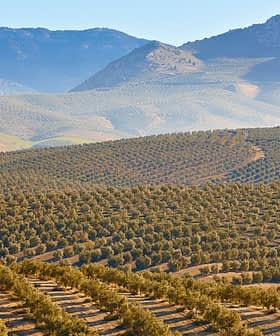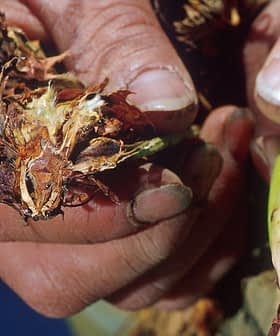olive oil research / page 17
Oct. 24, 2022
Following MedDiet Fortified With Polyphenols Reduces Visceral Adiposity
An 18-month trial showed a polyphenol-rich Med Diet might exceed the benefits of a traditional MedDiet against visceral adipose tissue accumulation.
Oct. 17, 2022
Olive Oil Aisles Result in Superior Supermarket Sales
Grouping all the olive oils in a single aisle and providing information about them resulted in an 18-percent increase in sales. Extra virgin olive oil sales rose 13 percent.
Oct. 12, 2022
Study: Med Diet Adherence Linked with Lower Intestinal Inflammation
Researchers theorized that fiber-rich foods associated with the MedDiet created an ecological advantage for certain microbes to flourish and contributed to lower levels of inflammation.
Oct. 12, 2022 World
Oct. 10, 2022 Production
One-Third of Global Olive Oil Production Comes from Intensive Farming
Oct. 6, 2022 Business
Sep. 29, 2022 Health
Sep. 22, 2022 News Briefs
Spanish Ministers Highlight Importance of Researching Health Benefits of Olive Oil
Sep. 21, 2022
Studies Indicate Labels Like Nutri-Score Help Consumers Make Healthy Choices
With Europe set to choose a mandatory food labeling system in the next six months, Nutri-Score remains the front-runner.
Sep. 9, 2022
Two major studies in the United States and Italy link premature death and colorectal cancer to highly processed food consumption.
Aug. 23, 2022
Researchers Find a Way to Expedite Photosynthesis
By manipulating the genes that affect photosynthesis, the researchers increased yields in soybeans by 20 percent. The process could be repeated in other crops.
Aug. 1, 2022
Climate Change Taking a Toll on Andalusian Olive Oil Production
Experts said farmers and producers must invest in modern irrigation infrastructure and prevent soil degradation to mitigate the impacts of climate change on Spanish producers.
Jul. 19, 2022
A New Spectroscopy Method to Determine Bitterness and Pungency in Olive Oil
A new study shows that fluorescence excitation-emission matrices can be used to predict virgin olive oil organoleptic characteristics.
Jul. 18, 2022
Adding Water During Olive Oil Production Lowers Quality, Researchers Find
Arbequina extra virgin olive oil produced without added water had higher levels of polyphenol and better oxidative stability than oils produced with added water.
Jul. 13, 2022
Consuming EVOO Results in More Polyphenols in Breast Milk, Study Finds
The study is reportedly the first to evaluate the possible vertical transmission of polyphenols to the offspring of laboratory rats fed extra virgin olive oil during pregnancy and lactation.
Jun. 28, 2022
Olive Leaves Can Improve Oil Quality, Researchers Find
Two studies demonstrated that milling olive leaves with the olives improved the oil’s sensory attributes in industrial and small-scale experiments.
Jun. 22, 2022
Scientists Identify Gene Responsible for Olive Oil’s Aroma
Researchers determined that manipulating the 13-HPL gene could allow farmers to predict olive oil aroma or create new cultivars with specific aromas.
Jun. 15, 2022
Researchers Identify Compounds to Stem the Spread of Verticillium Wilt
In a controlled experiment, researchers from the University of Córdoba reduced the development of the disease by 70 percent.
Jun. 2, 2022
Europe’s LIFE Resilience Project Offers Tools to Mitigate Spread of Xylella
LIFE Resilience has presented the results of a four-year-long project to stop the spread of Xyella fastidiosa and identify resistant varieties.
Jun. 2, 2022
Studying Plant Reactions to Environmental Stressors Key to Sustainable Agriculture
New research into plants’ molecular response to mechanical stimulation sheds new light on their response to environmental stressors and development.
May. 24, 2022
Anna Cane Re-Elected as President of Assitol’s Olive Oil Group
Cane said she would dedicate her third term as president to olive oil research and better educating the public about extra virgin olive oil.
May. 13, 2022
Following the MedDiet Improves Depression Symptoms in Young Men
Researchers said the results demonstrate the role of a healthy diet in the treatment of depression in young adults.
May. 5, 2022
Italian EVOO Reaches the International Space Station
Astronaut Samantha Cristoforetti brought four Italian monovarietals to the ISS, which will be used for a series of experiments and food preparation.
























